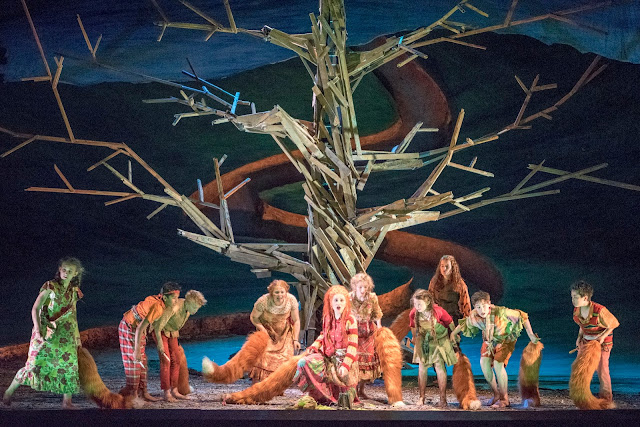Linbury Studio Theatre
Parasha – April Koyejo-AudigerHussar, Mavra – Egor Zhuravskii
Mother – Sarah Pring
Neighbour – Idunnu Münch
Pierrot – Alexandra Lowe
Rosanna Vize (designs)
Anjali Mehra (movement)
%20Alexandra%20Lowe%20Pierrot%20Lunaire%20%C2%A9%202022%20ROH.%20Pho_168.jpg) |
| Images: Helen Murray / ROH |
The Royal Opera’s Young Artists Programme celebrates twenty years with a Linbury double-bill of Stravinsky and Schoenberg, Mavra and Pierrot lunaire. It is an odd combination: one of Stravinsky’s less-loved works, a very short opera, with a cabaret melodrama that is no opera, yet is probably its composer’s single most celebrated work. If one tried hard enough, one could doubtless fathom a tenuous connection, but then one could probably do so between anything. Director Anthony Almeida, then, is probably right to have left his guiding thread at little more than surface level, concentrating instead on presentation of two unequal halves.
All too readily underestimated, Mavra, here given in a chamber arrangement by Paul Phillips, is in many ways emphatically a Russian work. If aspects of Stravinsky’s very particular sound world are necessarily lost—it was not solely on account of where I was seated that my experience was piano-heavy—an imaginative realisation, alluding consciously or otherwise to scores such as The Soldier’s Tale, presents other possibilities. Pushkin, in any case, seems unusually apparent, even, perhaps especially, in a staging that emphasises the formalism of something akin to face. Stravinsky always revels in patterns, in allusion, in parody, and in disjuncture: this has it all, musically and scenically. Colour and ‘look’ are to the fore, part of a surface that may or may not preclude discovery of anything beneath. The drag transformation of officer Vasily into maid Mavra amounts in a Warhol-like way to something, despite its essential nothingness. Is that, perhaps what a host of bin bags tell us? It also engineers a connection of sorts to Pierrot, where Almeida has a woman by contrast turn period androgyne. Indoors becomes outdoors; lighting becomes both alternative lighting (moon) and pitch blackness. Reappearance of Mavra’s cast seemed to me a little more forced, the sign interpreter more animated. Pierrot’s presence early on in in Mavra added little other than mild confusion, at least for me. Thought had been given, though, to an attempt to combine; that was enough, really.
Michael Papadopoulos, members of the Britten Sinfonia, and an able, alert cast captured well the knowing devices of Stravinsky’s score. It twists and turns, so long as one listens, and provides a splendid counterpoise—it certainly did here—to stage action that continues to surprise in its entirely unsurprising course. April Koyejo-Audiger reminded us, throughout, that whatever the games Stravinsky may have been playing, a Russian heart beat, sometimes irregularly, always metrically, beneath. Egor Zhuravskii offered dislocated bel canto contrast and complement. Sarah Pring and Idunnu Münch navigated with wit the fine line between stock characters and their light deconstruction, Glinka and the 1920s. If there were times when I missed the full instrumentation, the youth of this eternally young work nonetheless shone through.
Stravinsky must surely rank as one of Pierrot’s most quoted admirers. ‘The solar plexus as well as the mind of twentieth-century music,’ he called it, hailing on another occasion the ‘instrumental substance’ that had ‘impressed me immensely. And by saying “instrumental”, I mean not simply the instrumentation of this music but the whole contrapuntal and polyphonic structure of this brilliant masterpiece’. That came through, clearly, in a performance whose lines, reciter’s included, were supremely well balanced, wandering in tonality as in character. A touch more expressionism might not have gone amiss, but there are many worse things than a somewhat classicising Pierrot. Given its all-encompassing yet contradictory nature, the work doubtless resists a ‘complete’, let alone ‘ideal’, performance. It was nonetheless difficult to imagine Alexandra Lowe’s personal combination of speech, pitch, and gesture being readily improved upon.
If Pierrot took a slightly Stravinskian turn, what could be more contextually appropriate? Not that there was not darkness too, likewise catastrophe and sheer weirdness, but the balance had shifted. There will be other Pierrots, other attempts, as Beckett had it, to ‘fail better’, but this will have made new converts, who, like the rest of us, should prepare to be surprised once again by this ever-surprising chameleon of a work.
%20Egor%20Zhuravskii%20(Parasha)_116.jpg)

